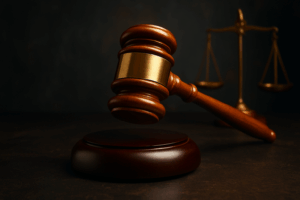In a recent court ruling, the Trump administration's efforts to withdraw Harvard University’s certification for international students have hit a temporary block, allowing the institution to continue its operations while the legal battle unfolds. This case raises significant questions on the government's influence over academic institutions and free speech rights.
Federal Court Stalls Trump's Visa Restrictions for International Students at Harvard

Federal Court Stalls Trump's Visa Restrictions for International Students at Harvard
A federal judge intervenes to secure Harvard’s ability to maintain its international student program amidst legal and political turmoil.
Harvard University has temporarily safeguarded its international student enrollment following a federal judge's intervention against the Trump administration's controversial visa restrictions. The Department of Homeland Security (DHS) recently attempted to decertify Harvard's participation in the Student and Exchange Visitor Program (SEVP), essential for hosting international scholars. After facing a lawsuit from Harvard, US District Judge Allison Burroughs granted a restraining order, and further elaborated that she intends to issue a preliminary injunction throughout the ongoing legal proceedings.
The legal dispute caught widespread attention as it extends beyond Harvard, affecting numerous international students and academic institutions across the United States. Central to this case are two pivotal legal questions: the legitimacy of the government's rationale for targeting Harvard's participation in the visa program, and whether any ideological motivations underlie this action, potentially infringing on Harvard's First Amendment rights.
Experts are keenly observing the case's trajectory, which could escalate to the First Circuit or even the US Supreme Court, given the implications it holds for the government's authority over higher education’s landscape. Underlying this case is the significant power the DHS exercises in certifying programs that enable international scholars to study in the US, leading to concerns over governmental overreach into academic freedoms.
Legal experts contend that the First Amendment provides strong protections against governmental actions perceived as retaliatory based on ideology. Harvard argues the administration's mindset, as evidenced through letters and statements, illustrates a calculated suppression of dissenting viewpoints that strain the university’s core functioning and principles. The administration has faced criticisms for allegedly conflating matters of safety and ideology, with communications suggesting a direct focus on Harvard's progressive outlook.
Furthermore, invoking the need to combat antisemitism, Secretary Noem's correspondence hinted at broader issues at stake, thus compelling Harvard to navigate federal scrutiny over its educational policies and practices. The ongoing legal battle could have lasting repercussions and raise critical issues around academic autonomy and freedom of expression, as lawyers note that the administration's actions may be perceived as both punitive and retaliatory.
Regardless of the eventual legal outcomes, experts warn that the rhetoric and policy directions coming out of the Trump administration could still deter prospective international students from applying to Harvard, resulting in a subtle chilling effect on international education enrollment. The persistent political discourse around the number of international students in American universities creates a challenging atmosphere for institutions like Harvard.
As this complex legal battle continues, many await the court's final decisions, which may redefine the boundaries between government oversight, academic freedom, and the rights of educational institutions like Harvard University.




















